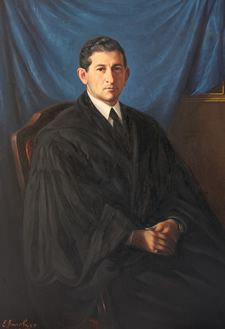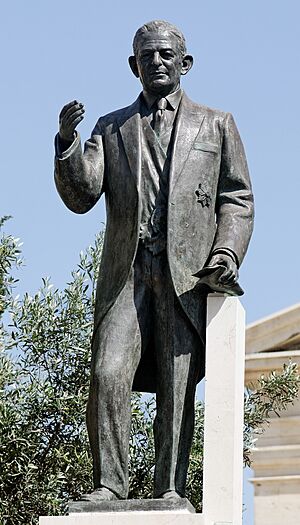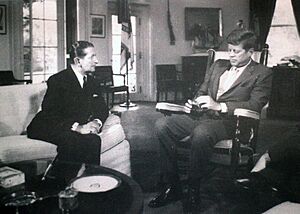George Borg Olivier facts for kids
Quick facts for kids
Giorgio Borg Olivier
GCPO KSS
|
|
|---|---|

Borg Olivier's official portrait
|
|
| 7th Prime Minister of Malta | |
| In office 5 March 1962 – 21 June 1971 |
|
| Monarch | Elizabeth II |
| Governor-General | Maurice Henry Dorman (from 1964) |
| Governor | Guy Grantham Maurice Henry Dorman (to 1964) |
| Preceded by | Dom Mintoff (1958) |
| Succeeded by | Dom Mintoff |
| In office 20 December 1950 – 11 March 1955 |
|
| Monarch | George VI Elizabeth II |
| Governor-General | Gerald Creasy Robert Edward Laycock |
| Preceded by | Enrico Mizzi |
| Succeeded by | Dom Mintoff |
| Personal details | |
| Born | 5 July 1911 Valletta, Crown Colony of Malta |
| Died | 29 October 1980 (aged 69) Sliema, Republic of Malta |
| Resting place | Addolorata Cemetery |
| Political party | Nationalist |
| Spouse | Alexandra Mattei (m. 1943–1980; his death) |
| Children | Angela Alexander Peter |
| Alma mater | Royal University of Malta |
| Occupation | Attorney, politician |
Giorgio Borg Olivier (born July 5, 1911 – died October 29, 1980) was an important Maltese leader and politician. He served as Prime Minister of Malta twice, first from 1950 to 1955, and then from 1962 to 1971. He was also the head of the Nationalist Party.
Borg Olivier also served as Leader of the Opposition from 1955 to 1958, and again from 1971 to 1977. He believed in making Malta a strong, independent country. He wanted to improve Malta's economy, especially by growing the tourism and construction industries.
Under his leadership, people's lives in Malta generally got better. Malta started to rely less on the British military. Towards the end of his time as Prime Minister, his government faced some challenges. He stepped down as the Nationalist Party leader in 1977 but remained a Member of Parliament until he passed away in 1980.
Contents
Early Life and Family
Where Was Giorgio Borg Olivier Born?
George Borg Olivier was born in Valletta, Malta, on July 5, 1911. His parents were Olivier Borg Olivier and Rosa Amato. He grew up in Valletta during the 1920s and 1930s.
Family's Political Background
Borg Olivier came from a family deeply involved in Nationalist politics. His uncle, Salvatore, was a speaker in parliament and a senator. He also led the opposition against another political party in the 1920s. Borg Olivier followed his uncle's path by becoming a notary, which is a legal professional.
Giorgio Borg Olivier's Education
He went to school at the Lyceum in Malta. Then, he studied at the Royal University of Malta, where he earned a law degree in 1937. As a university student, he was chosen to be the president of a student committee.
Personal Life
Giorgio Borg Olivier's Family
Giorgio Borg Olivier married Alexandra Mattei in 1943. They had three children: a daughter named Angela, and two sons, Alexander and Peter. Alexandra Borg Olivier passed away in 2009, and Peter Borg Olivier died in 2012.
Political Journey
Starting in Politics (1939–1950)
The 1930s were a difficult time for Malta. The war in Europe caused tension on the islands. Borg Olivier joined the Nationalist Party, which faced close watch when the war began. In 1939, he gave his first big speech in Siġġiewi.
He was one of three Nationalist members elected to the Council of Government in 1939. The Nationalist members believed that Malta was ready to govern itself. Borg Olivier also spoke out against the British government's actions of sending some Maltese citizens away without clear reasons.
In 1947, Borg Olivier was elected to the Legislative Assembly. He became the Deputy Leader of the Opposition.
From Minister to Prime Minister (1950–1955)
After the 1950 elections, Borg Olivier became the Minister for Public Works and Reconstruction, and also Minister of Education. This was in a Nationalist government led by Enrico Mizzi. When Mizzi passed away in December 1950, Borg Olivier became Prime Minister. He also became the leader of the Nationalist Party.
Because other parties made it hard for the government to work, new elections were held in May 1951. After these elections, Borg Olivier formed a government with another party, the Malta Workers' Party. He remained Prime Minister and Minister for Public Works. This government stayed in power until 1955.
During this time, Malta tried to define its relationship with the United Kingdom. In 1953, Borg Olivier was invited to the coronation of Queen Elizabeth II. He refused to go unless Malta was given special importance over other colonies. The British government agreed to treat Malta's Prime Minister equally with leaders of other important territories. This was seen as a diplomatic success for Borg Olivier.
He also suggested that Malta should become an independent country within the Commonwealth. This was different from the British idea of Malta becoming more closely linked to the UK's Home Office. These discussions set the stage for a political debate with Dom Mintoff's Malta Labour Party, which wanted Malta to become part of Britain.
Leading the Opposition (1955–1958)
The 1955 elections were about whether Malta should integrate with Britain or become an independent country. The Nationalist Party lost these elections, and Borg Olivier became the Leader of the Opposition.
He continued to argue for Malta to have full self-rule within the Commonwealth. He wanted Malta to be independent in its relationship with the UK, but still connected to the Commonwealth. However, the British government preferred Mintoff's idea of integration with Britain.
A referendum (a public vote) was held on integration. Borg Olivier asked people to boycott the vote, meaning not to participate. Even though many votes were cast for integration, the overall result showed that many people did not support the idea.
As British defense spending decreased, the idea of integration faded. Mintoff resigned, and there were protests in April 1958. Borg Olivier refused to form a government, so the governor had to suspend Malta's constitution.
Prime Minister Again (1962–1971)
Malta's Road to Independence
After the February 1962 election, Borg Olivier became Prime Minister again. He also took on the role of Minister of Economic Planning and Finance. In these elections, most voters wanted Malta to become independent.
Borg Olivier went to London to ask for financial help and to demand full independence for Malta within the Commonwealth. At this time, many people were unemployed, and there were worries about job losses from the Naval Arsenal. On August 20, 1962, Borg Olivier formally asked for independence.
A conference was held in London in July 1963 to discuss Malta's independence. Leaders from all political parties attended. Borg Olivier wanted Malta to be a monarchy with a Governor General representing the Queen.
Borg Olivier was clever in using the ongoing disagreements between the Labour Party and the Maltese church to his advantage. He was able to reduce the church's influence on Maltese politics. Both the Nationalist Party and the Labour Party wanted independence from Britain.
Borg Olivier tried to get more financial aid from Britain to help Malta after the British military presence was reduced. He famously said he didn't go to London "to make a silver collection," meaning he wanted serious financial support, not just a small amount.
The British government saw Borg Olivier and the Nationalists as the best choice to ensure democracy and stability in an independent Malta. After a public vote in May 1964, which approved the proposed independence constitution, talks continued in London.
On July 13, 1963, it was announced that Malta would become independent. On January 25, 1964, Borg Olivier was honored by Pope Paul VI. After more talks with the British government and preparing a new constitution, Borg Olivier set September 21 as Malta's Independence Day. This agreement included Britain keeping defense facilities for ten years and providing £51 million in financial aid.
On September 21, 1964, Borg Olivier received an honorary degree from the Royal University of Malta. In November 1964, he was again honored by Pope Paul VI.
Leading Independent Malta
In March 1965, Borg Olivier also became the Minister of Foreign and Commonwealth Affairs. In the March 1966 elections, the Nationalist Party won again, and he continued as Prime Minister. In June 1968, he received another honor from the Sovereign Military Order of Malta.
During this period, there were some public discussions about Borg Olivier's personal life. The Maltese church still had a big role in politics. Borg Olivier used the church's strong stance against the Labour Party to his political benefit. He supported the church's views against his main political rival.
Leader of the Opposition (1971–1977)
As the 1960s ended, Malta's economy faced challenges due to its reliance on construction and issues at the Dockyards. Many people felt that Borg Olivier's government was not active enough.
In the 1971 election, the Labour Party argued that the government was slow and out of touch. Dom Mintoff and the Labour Party won the election, and Borg Olivier became Leader of the Opposition again.
After losing the 1971 and 1976 elections, Borg Olivier faced more criticism within his own party. Some younger members felt he was not strong enough to win back support from Mintoff. They thought he often delayed making tough decisions.
In January 1974, many Nationalist Members of Parliament signed a statement saying they had no confidence in Borg Olivier's leadership. Only a few supported him, mostly his relatives and old friends. For a while, this support helped him keep his position. However, when his supporters could not stop Mintoff's plan to change Malta from a monarchy to a republic, his position became very weak.
After Mintoff won again in 1976, most Nationalists felt the party needed a new, younger, and more energetic leader. Eddie Fenech Adami, a newer Member of Parliament, became the party's leader in 1977. He was much younger and more determined than Borg Olivier. Under Fenech Adami, the party became stronger.
After stepping down as party leader, Borg Olivier became more private. He felt a sense of betrayal because he had encouraged Fenech Adami to stay in politics.
Death and State Funeral

Even though his health was getting worse, Borg Olivier tried to stay involved in public life. He had been battling lung cancer for several years. He passed away at his home in Sliema on October 29, 1980, at the age of 69.
Prime Minister Mintoff decided to organize a state funeral for Borg Olivier. It was the largest state funeral in Malta's history at that time. Thousands of people came to Valletta to pay their respects. He was buried at Addolorata cemetery in Paola, Malta.
A monument honoring Borg Olivier was built in Castille Square, Valletta, in 1989. This was part of the celebrations for the 25th anniversary of Malta's independence.
Honors and Awards
 Malta: Doctor of Literature (Honoris Causa), Royal University of Malta, September 1964
Malta: Doctor of Literature (Honoris Causa), Royal University of Malta, September 1964 Holy See: Grand Cross of the Order of St. Sylvester, January 1964
Holy See: Grand Cross of the Order of St. Sylvester, January 1964 Holy See: Grand Cross of the Order of Pius IX, November 1964
Holy See: Grand Cross of the Order of Pius IX, November 1964 Sovereign Military Order of Malta: Grand Cross of Merit, June 1968
Sovereign Military Order of Malta: Grand Cross of Merit, June 1968
See also
 In Spanish: Giorgio Borg Olivier para niños
In Spanish: Giorgio Borg Olivier para niños
- Prime Minister of Malta
- List of prime ministers of Malta
 | Stephanie Wilson |
 | Charles Bolden |
 | Ronald McNair |
 | Frederick D. Gregory |


